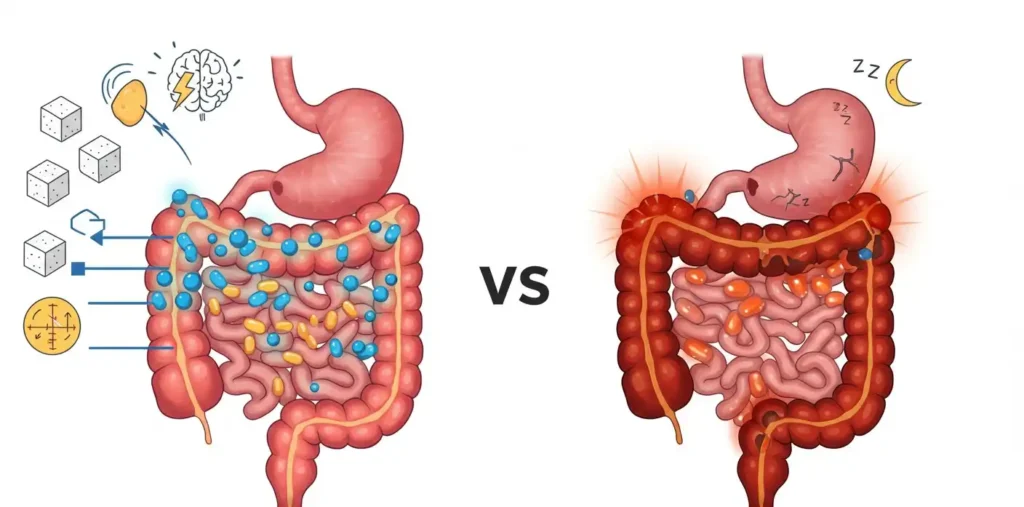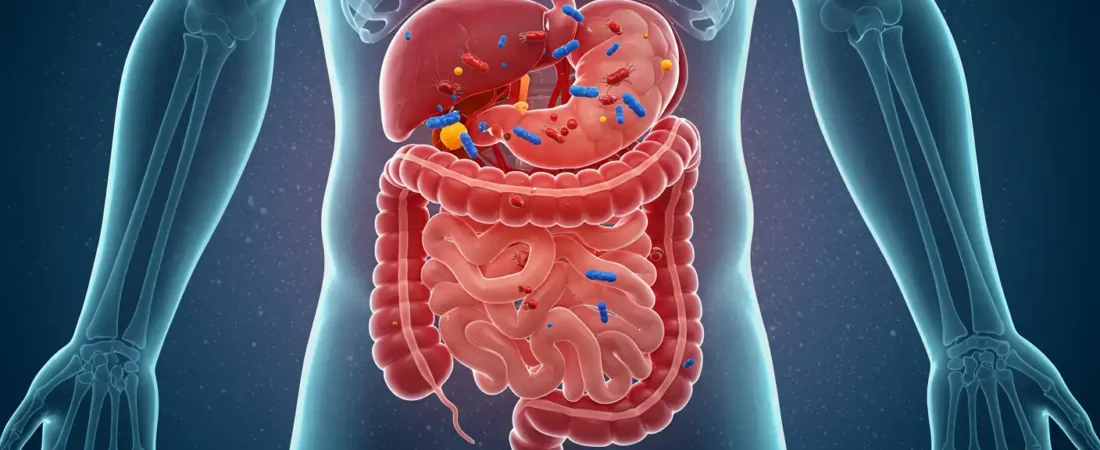Introduction
A healthy lifestyle begins in the gut. Your digestive system does more than break down food it directly impacts your mood, energy, and overall health. Modern science confirms that gut health influences mental clarity, immune strength, and emotional resilience. Understanding how to heal your gut naturally is one of the most transformative steps you can take for both your physical and emotional well-being.
Research shows that the gut and brain communicate constantly via the gut-brain axis a two-way communication system that connects emotional and cognitive centers of the brain with peripheral intestinal functions.
Why Gut Health Is Essential for a Healthy Lifestyle and Balanced Mood
In today’s fast-paced world, maintaining a healthy lifestyle goes far beyond exercise and calorie counting. One of the most critical yet often overlooked components of total wellness is your gut health. Your digestive system does much more than process food; it plays a pivotal role in immune defense, nutrient absorption, and even your emotional state. In this section, we’ll dive deep into how your gut influences your body and mind, and why improving it naturally can significantly enhance your overall quality of life.
Your Gut Is Truly Your Second Brain
Surprisingly, your gut contains over 100 million neurons more than the spinal cord. This intricate network, known as the enteric nervous system, operates semi-independently from your brain and plays a profound role in regulating mood, emotional well-being, and even cognitive clarity.
Because of this biological marvel, your gut is often referred to as your “second brain.” This isn’t just a catchy metaphor it’s a scientific reality. In fact, roughly 90% of serotonin, a neurotransmitter critical for mood regulation and happiness, is produced in the gut, not the brain. Likewise, other key mood-regulating chemicals such as dopamine and GABA are also synthesized in your digestive system.
When your gut microbiome the diverse ecosystem of bacteria in your digestive tract is balanced and thriving, you’re more likely to experience emotional stability, reduced anxiety, and increased motivation. However, when this balance is disturbed by poor diet, chronic stress, or antibiotic overuse, symptoms like brain fog, irritability, and even depression can emerge.
“The gut has been called the ‘second brain’ because it produces many of the same neurotransmitters as the brain, such as serotonin, dopamine, and gamma-aminobutyric acid, all of which play a key role in regulating mood.”— Harvard Health Publishing, 2022 (Source: Harvard Health)
The Immune Connection: Healthy Gut, Healthy Lifestyle
Gut Health Is the Foundation of Immune Strength
An astonishing 70% of your immune system is located in your gut. This is no coincidence. Your intestinal lining and the trillions of beneficial microbes that reside there are your body’s first line of defense against pathogens, toxins, and inflammation.
When your gut health is optimized, your microbiome produces short-chain fatty acids, antimicrobial peptides, and other compounds that enhance immune response and reduce chronic inflammation. Conversely, an imbalanced gut can allow harmful bacteria to flourish, making your body more susceptible to infections and autoimmune issues.
Strengthening your gut with probiotics, prebiotics, and a diet rich in fiber and fermented foods can not only boost immunity but also help your body recover faster from illness and stress.
Nutrient Absorption and Digestion: The Building Blocks of a Healthy Lifestyle
Why Healing Your Gut Improves Nutrient Uptake and Mental Focus
Even the healthiest diet will fall short if your digestive system isn’t functioning properly. A compromised gut can lead to malabsorption, meaning your body doesn’t extract and utilize the vital nutrients it needs from the food you consume.
By healing your gut through anti-inflammatory foods, adequate hydration, and the right probiotics you support the proper absorption of key nutrients like magnesium, zinc, B vitamins, and omega-3 fatty acids. These nutrients are essential not just for physical energy but also for brain function, emotional balance, and mood stability.
Moreover, reducing inflammation in the gut allows for more efficient enzyme activity, which improves digestion, reduces bloating, and enhances the overall feeling of well-being.
Top Causes of Poor Gut Health in the Modern Healthy Lifestyle

A truly healthy lifestyle goes beyond fitness routines and calorie counting it also means protecting your internal ecosystems, especially your gut. Unfortunately, many aspects of modern living directly contribute to poor gut health, which in turn can impact your digestion, immunity, and even your mood. Let’s explore the top culprits that silently sabotage your gut microbiome and overall well-being.
How Processed Foods and Sugar Destroy Gut Health and Mood Balance
In our fast-paced society, it’s all too easy to reach for ultra-processed foods and sugar-loaded snacks. However, while these may offer temporary satisfaction, they come with long-term consequences for your gut health.
Processed foods are often stripped of fiber, enzymes, and beneficial nutrients. Moreover, they contain emulsifiers, preservatives, and refined sugars that feed harmful bacteria in your gut. As a result, the balance between good and bad microbes is disrupted, leading to intestinal inflammation, bloating, and leaky gut syndrome.
Additionally, excess sugar promotes the growth of Candida albicans, a type of yeast that can overtake beneficial bacteria and contribute to fatigue, brain fog, and poor mood regulation. This creates a negative feedback loop: the worse your gut feels, the more likely your mental health will also decline.
“Diets high in refined sugar are associated with negative changes in gut microbiota composition.” — The American Journal of Clinical Nutrition, 2019
To combat this, adopting a healthy lifestyle with whole foods, fiber-rich vegetables, and fermented options can help rebalance your microbiome and support better digestion and mood stability.
Antibiotic Overuse and Its Long-Term Impact on Gut Flora
Antibiotics have revolutionized modern medicine by saving millions of lives. However, their overuse especially without medical necessity has unintended consequences for your gut health.
Antibiotics are not selective. While they effectively kill harmful bacteria, they also wipe out beneficial strains that are essential for digestion, immune modulation, and neurotransmitter production. This disruption creates a vulnerable environment where pathogens can flourish and probiotics can’t thrive.
Repeated antibiotic use without microbiome recovery can result in:
- Chronic digestive issues,
- Weakened immunity,
- Mood disturbances such as anxiety or depression.
To protect your gut, always use antibiotics responsibly and pair them with probiotics during and after treatment. Eating prebiotic-rich foods like garlic, onions, and oats can also help restore microbial diversity.
Chronic Stress and Sleep Deprivation: A Vicious Cycle for Gut and Mood
Stress is one of the most insidious threats to your gut health. When you’re under constant pressure, your body activates the sympathetic nervous system (fight-or-flight), which halts digestion, reduces blood flow to your intestines, and lowers enzyme production. Over time, this causes gut motility issues, constipation, and microbial imbalance.
Furthermore, chronic stress increases cortisol levels, which can compromise the gut lining and encourage inflammation. Poor sleep quality compounds these effects, leaving your body in a continuous state of repair deficit.
Lack of sleep doesn’t just affect your physical energy it also diminishes your gut’s ability to regenerate beneficial bacteria overnight. This twofold problem impacts not only digestion but also your emotional resilience and mood.
To reverse this, incorporating stress-reduction techniques like yoga, meditation, and adequate sleep hygiene can significantly improve gut health and support a more balanced emotional state.
Natural Ways to Improve Gut Health and Mood in a Healthy Lifestyle

If you’re aiming for a truly healthy lifestyle, healing your gut health naturally should be one of your top priorities. A well-functioning gut not only improves digestion and immunity but also plays a major role in regulating your mood and mental clarity. Fortunately, you don’t need expensive treatments to get started just simple, natural changes in your diet, habits, and mindset.
Eat Fermented Foods and Take High-Quality Probiotics for Gut Health
One of the most effective ways to promote a healthy gut microbiome is by incorporating fermented foods into your daily routine. Options like kimchi, sauerkraut, yogurt, kefir, and kombucha contain live beneficial bacteria that replenish your digestive system with vital probiotics.
For consistent support, probiotic supplements can be added look for products with at least 10 billion CFUs (colony-forming units) and multiple bacterial strains to enhance microbial diversity and long-term gut resilience.
Research has increasingly shown a powerful link between probiotics and mental well-being. As Harvard Health notes:
“Probiotics have been linked to improved mood, decreased anxiety, and even reduced symptoms of depression.” — Harvard Health Publishing, 2021
These “friendly bacteria” help regulate neurotransmitters such as serotonin and dopamine, directly influencing your mood, motivation, and even your sleep cycle.
Boost Prebiotic Fiber Intake to Feed Probiotics and Improve Gut Health
While probiotics are essential, they need the right fuel to thrive. This is where prebiotic fibers come into play. These are indigestible plant fibers that act as food for your healthy gut bacteria, helping them multiply and stabilize.
Here are some excellent prebiotic-rich foods you can incorporate into your meals:
- Garlic
- Onions
- Asparagus
- Bananas
- Oats
Consuming these regularly not only supports a diverse microbiome but also helps regulate bowel movements, reduce inflammation, and enhance mood by supporting gut-brain communication.
Stay Hydrated to Support Digestion and Nutrient Absorption
Water plays a crucial role in your overall gut health. Proper hydration facilitates smoother digestion, efficient nutrient transport, and the removal of toxins from the body.
When your body is well-hydrated:
- Digestive enzymes function more effectively
- Waste is eliminated more regularly
- Nutrients like B vitamins and magnesium are delivered to your brain, enhancing cognitive performance and mood balance
Make it a habit to drink at least 2 liters of water daily, and more if you’re physically active or live in a hot climate.
Manage Stress Naturally to Heal the Gut and Elevate Mood
Chronic stress is one of the biggest threats to gut health. Fortunately, natural stress-reduction techniques like meditation, breathwork, and yoga can activate the parasympathetic nervous system, also known as the “rest and digest” state.
When the body shifts into this state, inflammation drops, digestion improves, and communication via the vagus nerve strengthens resulting in better mood regulation and mental clarity.
Even just 10–15 minutes of mindfulness or stretching per day can significantly reduce stress levels and begin the healing process for your gut.
Prioritize Deep, Restorative Sleep to Reset the Microbiome
Sleep is when your body and particularly your gut enters repair mode. During deep, uninterrupted sleep, your microbiome regenerates, hormones rebalance, and your immune system strengthens.
Experts recommend 7–9 hours of quality sleep each night. You can enhance your rest by:
- Establishing a consistent sleep schedule
- Reducing screen time before bed
- Sleeping in a dark, cool environment
- Avoiding caffeine after 2 PM
Good sleep hygiene not only supports digestion and gut health, but it also boosts serotonin production directly enhancing your mood and emotional stability.
The Best Diet for Gut Health and Emotional Balance in a Healthy Lifestyle

When it comes to cultivating a truly healthy lifestyle, what you eat plays a foundational role especially when it involves supporting your gut health and emotional resilience. The gut-brain axis is a powerful communication system that connects your digestive system directly to your brain. Thus, your dietary choices can influence not only your physical health but also your mood, stress levels, and mental clarity.
Let’s dive into the most science-backed nutritional strategies for optimizing your gut health and achieving a more balanced emotional state.
The Mediterranean Diet A Gut-Healthy Lifestyle for Mood and Longevity
If there’s one diet that consistently ranks high for its health benefits, it’s the Mediterranean diet. Rooted in centuries-old eating patterns from countries bordering the Mediterranean Sea, this anti-inflammatory diet is rich in:
- Leafy green vegetables
- Whole grains
- Legumes and beans
- Nuts and seeds
- Lean proteins like fish and poultry
- Healthy fats such as extra virgin olive oil
Studies have shown that this diet not only promotes gut health by feeding beneficial microbes with high-fiber, plant-based foods but also significantly reduces symptoms of depression and anxiety.
“Adherence to a Mediterranean diet has been associated with lower risk of depression, likely through modulation of gut microbiota and inflammatory pathways.” — Nutrients Journal, 2020
The inclusion of omega-3 fatty acids from fatty fish like salmon further supports mood stability, while fiber-rich foods feed your microbiome and promote digestive regularity.
Avoiding Gut Irritants to Protect Gut Lining and Improve Mood
While it’s important to include gut-supportive foods, it’s equally crucial to reduce or eliminate substances that may harm your gut lining or trigger inflammation. The following are common gut irritants that can interfere with your microbiome and overall gut health:
- Artificial sweeteners (e.g., aspartame, sucralose): Linked to disrupted microbial balance.
- Gluten (for sensitive individuals): Can trigger leaky gut in those with celiac or gluten sensitivity.
- Refined carbohydrates: Promote overgrowth of harmful bacteria.
- Excess alcohol: Damages gut lining and suppresses beneficial microbes.
These irritants can contribute to increased intestinal permeability often referred to as leaky gut which may trigger systemic inflammation, worsen mental clarity, and negatively affect your mood.
Avoiding or reducing these compounds is a significant step toward restoring a thriving gut ecosystem and cultivating a more balanced emotional lifestyle.
Healing Gut Health Naturally with Anti-inflammatory Herbs and Spices
Nature offers a variety of anti-inflammatory herbs and spices that do more than just flavor your meals—they actively heal and support your gut health and improve emotional balance.
Here are three top-performing options:
- Turmeric (Curcumin): This golden spice contains curcumin, a powerful compound known for its anti-inflammatory and gut-healing properties. It helps calm inflammation in the intestinal lining and supports microbial balance.
- Ginger: Well-known for its digestive benefits, ginger reduces nausea, stimulates digestive enzymes, and soothes intestinal discomfort—making it a gut-health superfood.
- Peppermint: Used for centuries to ease digestive spasms, peppermint relaxes the gut wall, improves bile flow, and helps regulate microbiota. Peppermint oil is even used therapeutically for IBS (Irritable Bowel Syndrome).
Adding these spices to soups, teas, smoothies, or stir-fries is a simple way to support a healthier gut and a more positive mood.
Gut Health Supplements That Support a Healthy Lifestyle and Improve Mood
In today’s fast-paced world, even with the best intentions, it can be challenging to maintain a perfectly balanced diet. That’s where gut health supplements come in. These natural aids can help bridge nutritional gaps, restore microbial balance, and promote a truly healthy lifestyle. Whether you’re dealing with bloating, fatigue, or mood swings, the right combination of supplements may be just what your gut needs to thrive.
However, while supplements can be powerful allies, it’s important to remember they should support not replace a nutrient-rich diet and gut-friendly habits.
Let’s explore some of the most effective and research-backed supplements to boost your gut health and uplift your mood naturally.
Probiotics: The Cornerstone of Gut Health and Emotional Well-being
Probiotics are live bacteria that support your microbiome. They can help repopulate the gut with beneficial strains, especially after illness, antibiotic use, or chronic stress. The most studied strains for gut and mood support include:
- Lactobacillus acidophilus – Known for supporting digestion and reducing IBS symptoms.
- Bifidobacterium longum – Shown to improve anxiety and promote brain-gut balance.
“Probiotic supplementation can positively affect mood, cognitive function, and reduce symptoms of depression by influencing the gut-brain axis.” — Harvard Health Publishing, 2021
Choose a product with at least 10–20 billion CFUs and multiple strains for best results. For added synergy, pair probiotics with prebiotics like inulin or FOS to feed and sustain them.
L-Glutamine: A Natural Healer for the Gut Lining
L-Glutamine is an amino acid that acts as fuel for intestinal cells and supports the repair of the gut lining. It’s particularly beneficial for individuals dealing with leaky gut, chronic inflammation, or poor nutrient absorption.
Consistent supplementation may help restore the integrity of the gut wall and improve digestion, indirectly supporting immune function and mood regulation.
Zinc Carnosine: Fighting Gut Inflammation Naturally
This unique combination of zinc and L-carnosine has been shown to reduce gut inflammation, promote mucosal healing, and protect the stomach lining. It works by:
- Reducing oxidative stress
- Supporting tight junction proteins
- Encouraging tissue repair in the GI tract
Clinical studies suggest zinc carnosine is especially helpful in conditions like gastritis and ulcers, where gut health is compromised and inflammation affects overall wellness.
Digestive Enzymes: Optimizing Nutrient Absorption for a Healthy Mood
Digestive enzymes help your body break down macronutrients proteins, carbs, and fats into absorbable components. This ensures your body extracts the maximum benefit from every bite, especially if you struggle with bloating or indigestion.
Key enzymes to look for:
- Amylase (carbs)
- Protease (proteins)
- Lipase (fats)
- Lactase (dairy digestion)
By improving digestion, these enzymes help reduce inflammation and gas, support gut microbiome balance, and indirectly enhance mood by ensuring your brain receives the nutrients it needs.
Important Consideration: Consult a Professional Before Starting
While all these supplements offer promising benefits, it’s essential to approach supplementation with care. Everyone’s gut health is unique, and what works for one person may not be ideal for another.
Always consult a qualified healthcare provider before beginning any new supplement regimen, especially if you have pre-existing health conditions or are taking medications. Personalized guidance ensures safety and maximizes benefits tailored to your specific needs.
Signs Your Gut Is Healing and Your Mood Is Improving Naturally

Achieving optimal gut health is one of the most transformative steps you can take toward a truly healthy lifestyle. As your digestive system begins to repair and rebalance, you may notice a ripple effect across your entire body especially in your mood, focus, and energy levels.
Although gut healing doesn’t happen overnight, the progress is both measurable and meaningful. By tuning in to your body and tracking subtle shifts, you’ll begin to recognize when your gut is truly on the mend.
In this section, we’ll explore the top signs that your gut health is improving and how that contributes to a more stable and vibrant emotional state.
Steady Energy and Less Fatigue: A Sign of Gut-Brain Harmony
One of the earliest and most noticeable signs of improved gut health is consistent energy levels throughout the day. If you used to experience a mid-afternoon crash or morning sluggishness, you might find yourself feeling more balanced and alert.
This happens because your gut is now better able to absorb nutrients like B vitamins, magnesium, and iron crucial components for cellular energy and brain function.
Fewer Sugar Cravings: Balanced Microbes Mean Better Control
If you’ve struggled with uncontrollable cravings for sweets, a healthier microbiome may finally set you free. Harmful gut bacteria feed on sugar and often manipulate your cravings to favor their survival.
As probiotics and healthy bacteria flourish, they begin to crowd out those sugar-hungry strains. The result? A more balanced appetite and fewer urges to snack unnecessarily.
“The gut microbiota influences taste receptors and appetite-regulating hormones, contributing to cravings and mood regulation.” — National Institutes of Health (NIH), 2022
Improved Mood and Emotional Stability
Because around 90% of serotonin is produced in the gut, any improvements in your intestinal environment directly impact your emotional well-being. You may begin to feel:
- Calmer in stressful situations
- Less prone to anxiety
- More emotionally resilient
These improvements are clear signs that your gut-brain axis is functioning more effectively, thanks to reduced inflammation and better neurotransmitter synthesis.
Regular Bowel Movements and Less Bloating
Healthy digestion is a cornerstone of gut healing. As your microbiome stabilizes, you’ll notice:
- More consistent bowel movements
- Less bloating after meals
- Reduced gas and abdominal discomfort
This is a result of improved bacterial diversity, stronger intestinal motility, and fewer fermenting, pathogenic microbes in the gut.
Mental Clarity and Sharper Focus
The gut is often called the “second brain” for a reason. When it’s healthy, cognitive benefits follow. As inflammation decreases and nutrient absorption improves, you may feel:
- More focused throughout the day
- Sharper memory
- Increased creativity and productivity
In short, a healthy gut fuels a healthy mind.
Healing Is a Journey, Not a Quick Fix
Finally, it’s essential to embrace the process. Gut healing requires consistency, patience, and self-compassion. Progress may be slow at times, but every small improvement counts toward a stronger body and a happier brain.
Celebrate these signs as milestones in your healing journey, and remember: you are building the foundation for a more energized, emotionally balanced, and truly healthy lifestyle.
How to Maintain Gut Health for a Lifelong Healthy Lifestyle

Maintaining optimal gut health isn’t just a short-term goal it’s the foundation for a lifelong healthy lifestyle. Once your gut is healed, the next step is sustaining that balance. Doing so will not only improve digestion but also support emotional resilience, sharper focus, and long-term disease prevention.
Incorporating gut-friendly practices into your daily routine ensures that the benefits of healing are not only preserved but also amplified over time. Below, we’ll explore science-backed habits and mindset shifts to help you nurture your microbiome and elevate your overall well-being.
Daily Habits That Sustain a Healthy Gut and Balanced Mood
Consistency is key when it comes to sustaining gut health. By making small, intentional choices each day, you can support your digestive system and promote a positive mood naturally.
Here are powerful habits to incorporate into your routine:
- Start Your Morning with Warm Lemon Water: This gentle ritual helps stimulate digestive enzymes and hydrate your body after sleep.
- Eat Mindfully and Chew Thoroughly: Digestion begins in the mouth. Chewing well reduces the burden on your stomach and allows nutrients to be better absorbed.
- Include Probiotic and Prebiotic Foods at Every Meal: Combine fermented foods like kefir or kimchi with prebiotics such as onions, bananas, or oats. This synergy supports microbial diversity and enhances digestion.
“A diet rich in diverse plant fibers and fermented foods has been shown to increase microbiota diversity and reduce inflammation.” — Stanford School of Medicine, 2021
- Move Your Body Regularly: Physical activity supports gut motility and reduces stress both essential for maintaining a balanced microbiome. Aim for daily movement like brisk walks, yoga, or strength training.
- Reduce Screen Time Before Bed: Digital devices can disrupt melatonin production and impair sleep quality. Since your gut repairs itself during deep sleep, maintaining a healthy sleep routine is essential.
These practices don’t have to feel overwhelming. Even integrating one or two consistently can begin to shift your body toward long-term health and emotional balance.
Tracking Your Gut and Mood Connection for Deeper Insights
While external habits are crucial, internal awareness also plays a vital role in maintaining a healthy gut and stable mood. That’s why many functional health experts recommend keeping a gut and mood journal.
This simple practice can help you:
- Identify which foods cause bloating, fatigue, or mood swings
- Notice patterns in digestion or sleep quality
- Reflect on the emotional triggers that may impact your gut
Start by tracking:
- What you eat (include meals, snacks, and beverages)
- Your bowel movements (frequency, texture, ease)
- Daily mood and energy levels
- Quality and duration of sleep
Over time, these notes become invaluable tools for fine-tuning your healthy lifestyle. You may even uncover hidden sensitivities or lifestyle factors interfering with your gut-brain connection.
FAQs About Gut Health and Mood
How long does it take to heal the gut naturally?
Typically, 4–12 weeks of consistent healthy habits can bring noticeable changes. Deep healing may take longer depending on your starting point.
Can gut health really affect mental health?
Absolutely. Numerous studies show a strong link between microbiome diversity and psychological well-being, including anxiety and depression symptoms.
Do probiotics work for everyone?
Not all probiotics are created equal, and results can vary by individual. It may take experimenting with strains and dosage to find what works for you.
Conclusion: Take Control of Your Gut Health and Transform Your Life
Your journey to a healthy lifestyle starts from within. By healing your gut naturally, you’re not only supporting digestion but also enhancing your emotional resilience, brain clarity, and overall vitality. Whether you’re just starting or fine-tuning your habits, every choice you make adds up.






